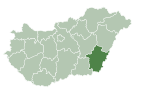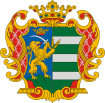Gyomaendrőd
Gyomaendrőd | |
|---|---|
 Town hall | |
 Flag  Coat of arms | |
 Gyomaendrőd | |
| Coordinates: 46°56′10″N 20°49′25″E / 46.93611°N 20.82361°ECoordinates: 46°56′10″N 20°49′25″E / 46.93611°N 20.82361°E | |
| Country | |
| County | Békés |
| District | Gyomaendrőd |
| Area | |
| • Total | 303.98 km2 (117.37 sq mi) |
| Population (2011) | |
| • Total | 13,680 |
| • Density | 49.66/km2 (128.6/sq mi) |
| Time zone | UTC+1 (CET) |
| • Summer (DST) | UTC+2 (CEST) |
| Postal code | 5500, 5502 |
| Area code | (+36) 66 |
| Website | www |

Gyomaendrőd is a town in Békés county, Hungary.
Name[]
Gyoma is an old Hungarian male given name,[1] while Endrőd means "belongs to Endre (Hungarian to Andrew)" or "property of Endre".
Geography[]
Gyomaendrőd is located in the Great Hungarian Plain upon the river Körös, 177 km (110 mi) southeast from Budapest. Highway 46, 443 and Budapest-Szolnok-Békéscsaba-Lökösháza high speed (120–160 km/h (75–99 mph)) railway line also cross the town.[2]
History[]
The smaller towns of Gyoma and Endrőd were united in 1982.[3] Gyoma was first mentioned in 1332, while Endrőd in 1416.[3] Medieval towns were ruined due to the Ottoman wars, native Hungarian population fled from the area.[4] It was uninhabited until the early 18th century, when Calvinist Hungarians reestablished Gyoma. Calvinist church was built from 1791 to 1813.[3] Endrőd was rebuilt by Roman Catholic Slovaks and Hungarians from Upper Hungary.[4] Slovaks adopted Hungarian language and assimilated into the Hungarian majority by the 19th century.[4] Lutheran Germans also settled in Gyoma in the early 19th century,[4] their church was built in 1862. In the 20th century Gyomaendrőd became a resort town, the government granted town rights in 1989.[3]
Demographics[]
According to the 2011 census the total population of Gyomaendrőd was 13,680, of whom there were 11,547 (84.4%) Hungarians, 613 (4.5%) Romani and 163 (1.2%) Germans by ethnicity. 15.6% did not declare their ethnicity,[5] excluding these people Hungarians made up 100% of the total population. In Hungary people can declare more than one ethnicity, so some people declared a minority one along with Hungarian.[6][7]
In 2011 there were 3,458 (25.3%) Roman Catholic, 1,483 (10.8%) Hungarian Reformed (Calvinist) and 183 (1.3%) Lutheran in Gyomaendrőd. 4,644 people (34.0%) were irreligious and 170 (1.2%) Atheist, while 3,602 people (26.3%) did not declare their religion.[6]
Notable people[]
- János Pásztor (1881–1945), sculptor
- Kálmán Rózsahegyi (1873–1961), actor
- Ferenc Kállai (1925–2010), actor
Twin towns – sister cities[]
Gyomaendrőd is twinned with:[8]
References[]
- ^ János Ladó - Ágnes Bíró: Magyar utónévkönyv ("Book of Hungarian given names"), Vince Kiadó, Budapest, 2005, ISBN 963-9069-72-8
- ^ Magyarország autóatlasz, Dimap-Szarvas, Budapest, 2004, ISBN 963-03-7576-1
- ^ Jump up to: a b c d Gyomaendrőd, Tourinform Iroda Gyomaendrőd, 2010, p.33, pp.1-16
- ^ Jump up to: a b c d Károly Kocsis (DSc, University of Miskolc) – Zsolt Bottlik (PhD, Budapest University) – Patrik Tátrai: Etnikai térfolyamatok a Kárpát-medence határon túli régióiban, Magyar Tudományos Akadémia (Hungarian Academy of Sciences) – Földrajtudományi Kutatóintézet (Academy of Geographical Studies); Budapest; 2006.; ISBN 963-9545-10-4, CD Atlas
- ^ Gazetteer of Hungary / Gyomaendrőd
- ^ Jump up to: a b 2011 Hungarian census, Békés county
- ^ Hungarian census 2011 - final data and methodology
- ^ "Testvérvárosaink". gyomaendrod.com (in Hungarian). Gyomaendrőd. Retrieved 2021-04-09.
External links[]
| Wikimedia Commons has media related to Gyomaendrőd. |
- Official website in Hungarian, English and German
- Populated places in Békés County


